
VN Guitars Eric Delaite Luthier Interview 1 Background
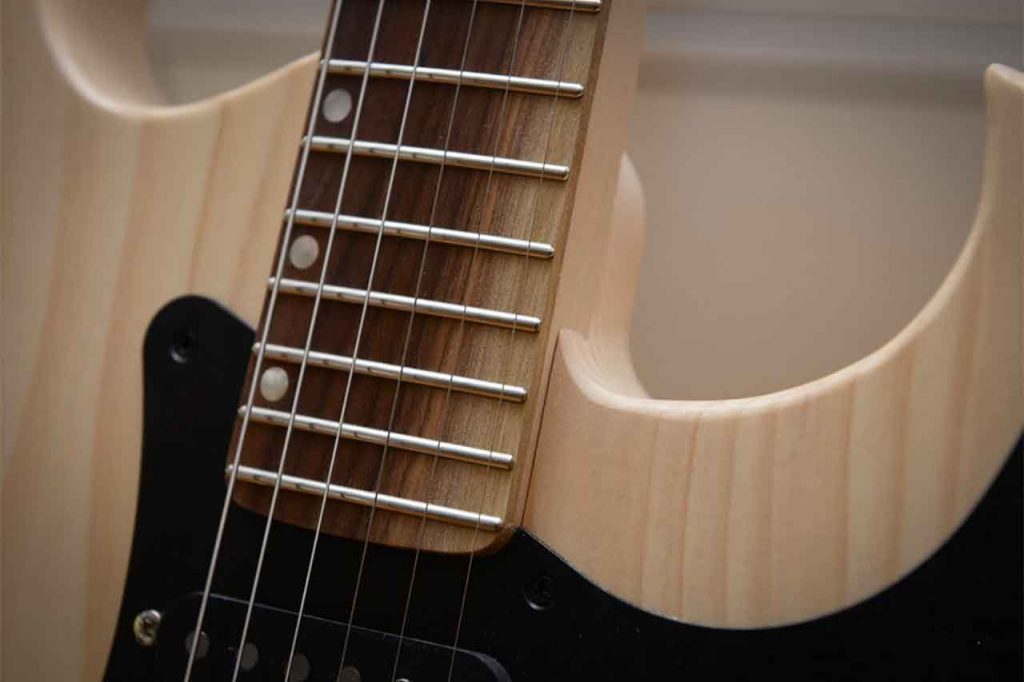
VN Guitars Eric Delaite Luthier Guitares Interview 1 Background
Vous pouvez également découvrir cette interview en français https://luthiers.com/eric-delaite-luthier-vn-guitares-interview-1-background/
VN Guitars Eric Delaite Luthier – For those who don’t know you yet, can you tell us about your background? Did you go to a luthier school? Did you train with established luthiers? And, if it’s not indiscreet, what did you do before starting this adventure? Were you a musician before becoming a luthier ? Or were you doing something else ? And, by the way, do you still find time to play music with your work as a luthier?
I am an autodidact, not because I want to, but more because of the history of my career.
Trained as an electro-mechanic, I created a company in 1995 for industrial subcontracting for the automotive and aeronautical industries. This adventure ended in 2009 with the crisis, and of the 40 people there are only 5 left to date. The buyer kindly asked me to look elsewhere…
So I created a new company, Au Coeur 2, in the wood industry.
Since then, I work alone or almost.
Being a bit of a musician, and seeing beautiful pieces of wood from the Vosges in my workshop, I had the idea to build my own instruments.
With my experience in CAD design, machining and electronics, combined with a very good knowledge of local woods, I naturally designed the first Vosgesnote.
And yes, I don’t play as often as I would like, I rarely count my hours, like all luthiers I think!
I also have a family, a supportive wife and three children.
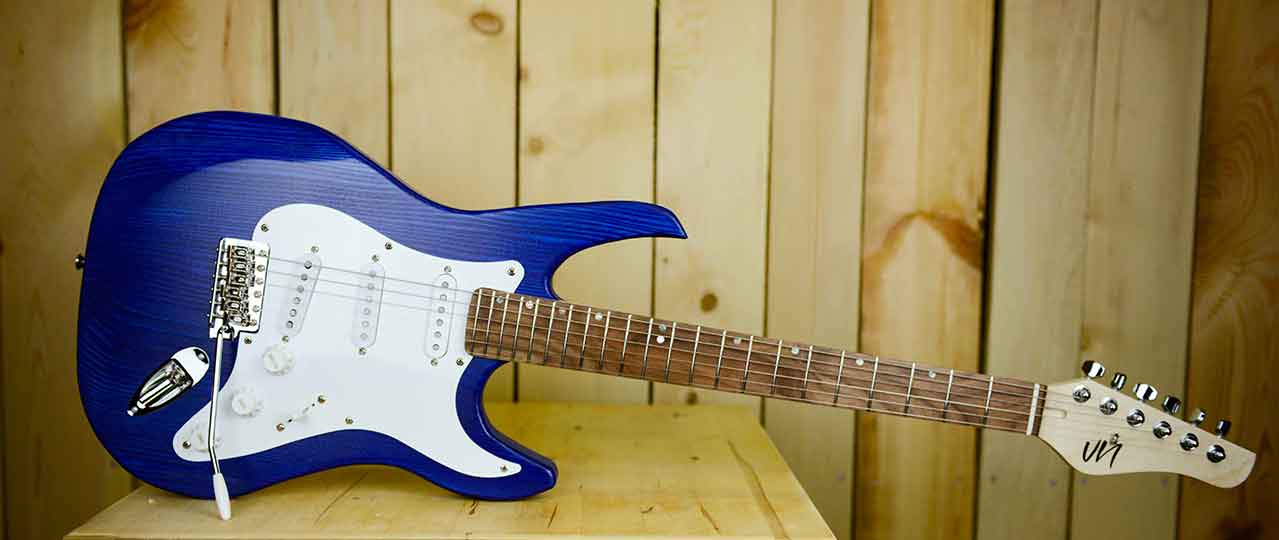
VN Guitars Eric Delaite Luthier – Apart from creating custom instruments, we know that you do all kinds of repairs and maintenance of guitars and basses, can you also take care of other types of plucked and bowed instruments?
Unfortunately, no, apart from my grandfather’s two old violins on which I just do classical maintenance, I don’t have the skills for it.
Can you tell us about your current flagship models? Do you have a range that you do regularly ? Do you also make unique custom models ? How did you proceed to make them ? What were your choices and your creation process ? What kind of musicians are they for ?
My flagship model at the moment is the Chamois.
A great classic Strat type, but with the use of 100% Vosges wood.
It is intended for demanding multi-talented musicians, but without going into stratospheric prices (pun intended).
It has a very fine neck, a very good balance and pickups with a very good quality-price ratio (the SP Custom 62).
It is also an instrument committed to promoting the use of local woods.
As such, every time a musician tries it, he is bluffed by the sustain brought by the fir on the body. So yes, the use of local woods has many other qualities than purely ideological.
Of course I make custom models, it’s a lot of fun.
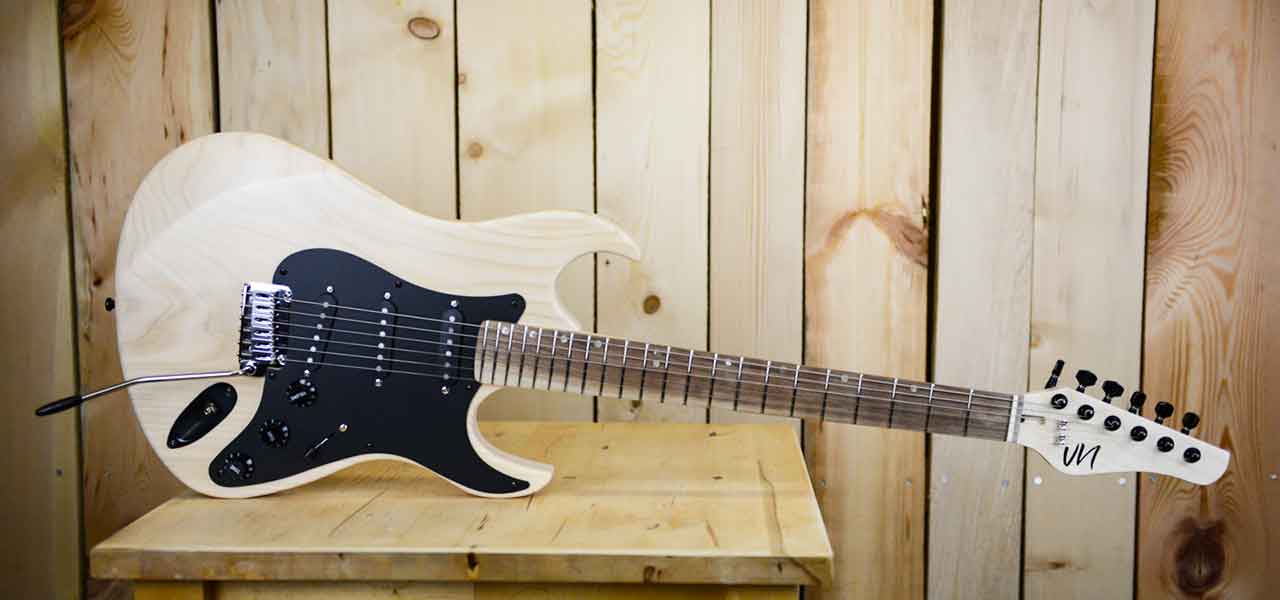
Otherwise, I’m working on a “signature” model, with a 3D body, a humbucker pickup, ultra simplified electronics, and very trendy colors.
I also have a bass in design, I am very curious to make the tree sound on this instrument!
And when I get bored (rarely…) I continue to make my classic…
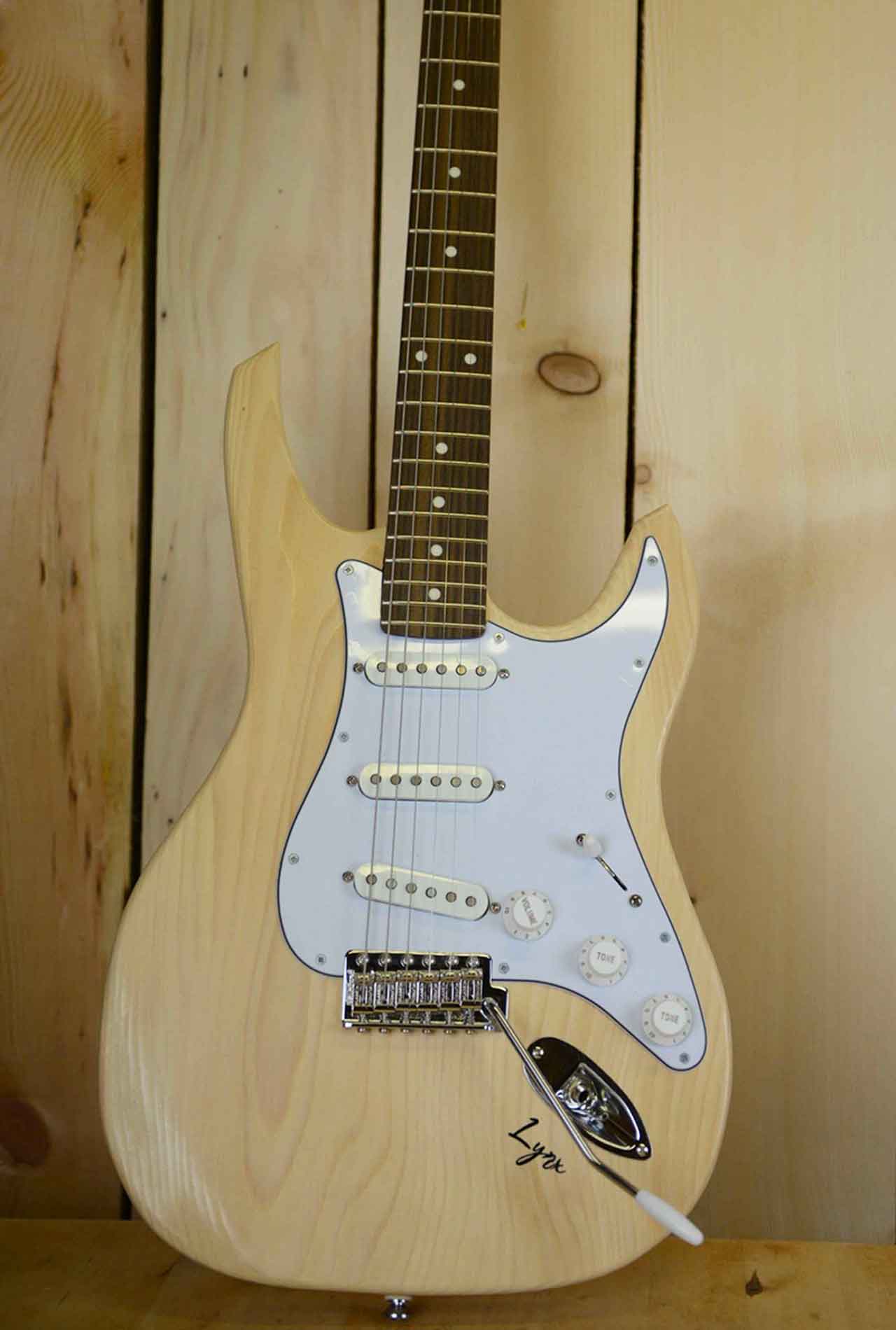
VN Guitars Eric Delaite Luthier – Computers have become a part of everyone’s daily life, no matter what profession you practice. Do you use particular tools in the field of lutherie? Can you tell us about them ?
And yes, it is absolutely vital, much more so now given the context.
I make all my websites myself, either in page layout with ToWeb, or in e-commerce with Prestashop.
Of course, I have been working with 3D CAD for more than 25 years, which is a real plus for the design.
In my classic woodworking job, I regularly use CNC machining, I also do it a little in lutherie, but it is not always as “idyllic” as one would like to think.
Indeed, making a machining program is quite long, and it is often easier to do the unit operations by hand.
On the other hand, CNC is very useful for roughing out certain parts such as pickup cavities, holes for the neck attachment, etc.
For luthiers who wonder if it’s worth it to equip themselves with CNC, I would say that it depends on the production volume. Below 4 guitars per month, it is not profitable.
And I’m talking about profitability just in terms of time saving, not in terms of financial amortization
A new CNC 3 axis 900×600 NC is about 5000€.
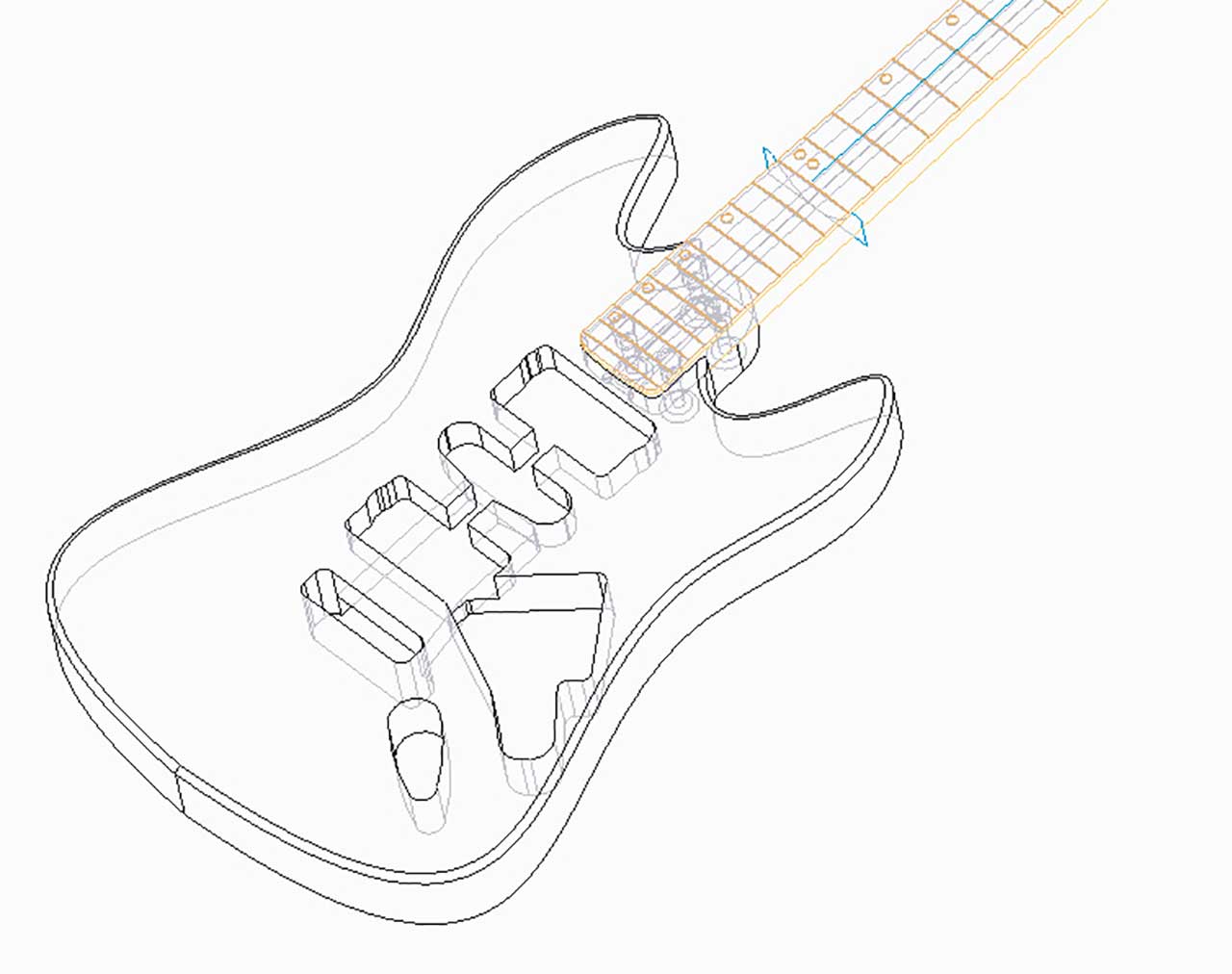
VN Guitars Eric Delaite Luthier – Those who know you know that you are a big fan of beautiful woods, how do you help your customers to choose the woods of their future guitar according to the sound they have in mind ? Are you able to find wood easily in your network ? If so, can you name some of your suppliers ?
I use almost only local Vosges species, namely fir, spruce, lime, maple and walnut.
Each species is used in a specific part.
Fir and basswood for electric guitar bodies, maple for the neck, walnut for the fingerboard and spruce for the soundboards.
The choice will therefore be purely aesthetic most of the time.
On the other hand, depending on the desired custom, I will prefer a one-piece body in spruce or laminated basswood.
My main supplier is my local sawyer located 5 km from my home.
He is specialized in woodworks, but not in lutherie… It is because I am often at his place that he puts aside the most beautiful pieces for my guitars!
Also note that I cut myself some trees of my forest with my small mobile sawmill, to make very special pieces.
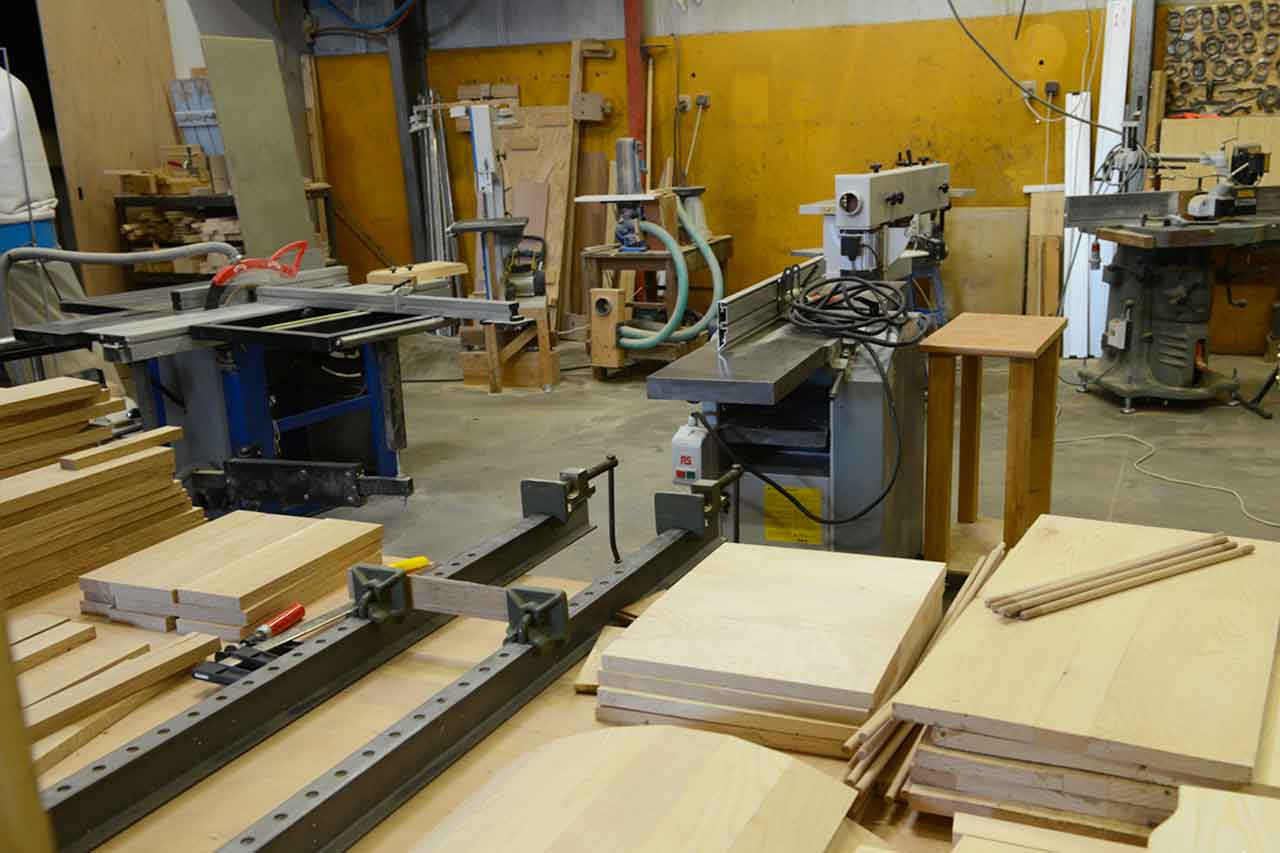
There is a huge choice of aftermarket parts. Do you work with regular suppliers or are you always on the lookout for new suppliers who can offer you something new? Do you have any examples to give us?
I try not to change suppliers all the time, it is tempting, but very time consuming…
But yes, I’m always on the lookout for new things, like all musicians, it’s a bad habit (lol).
So I work mainly with Fred. They are reactive and in France.
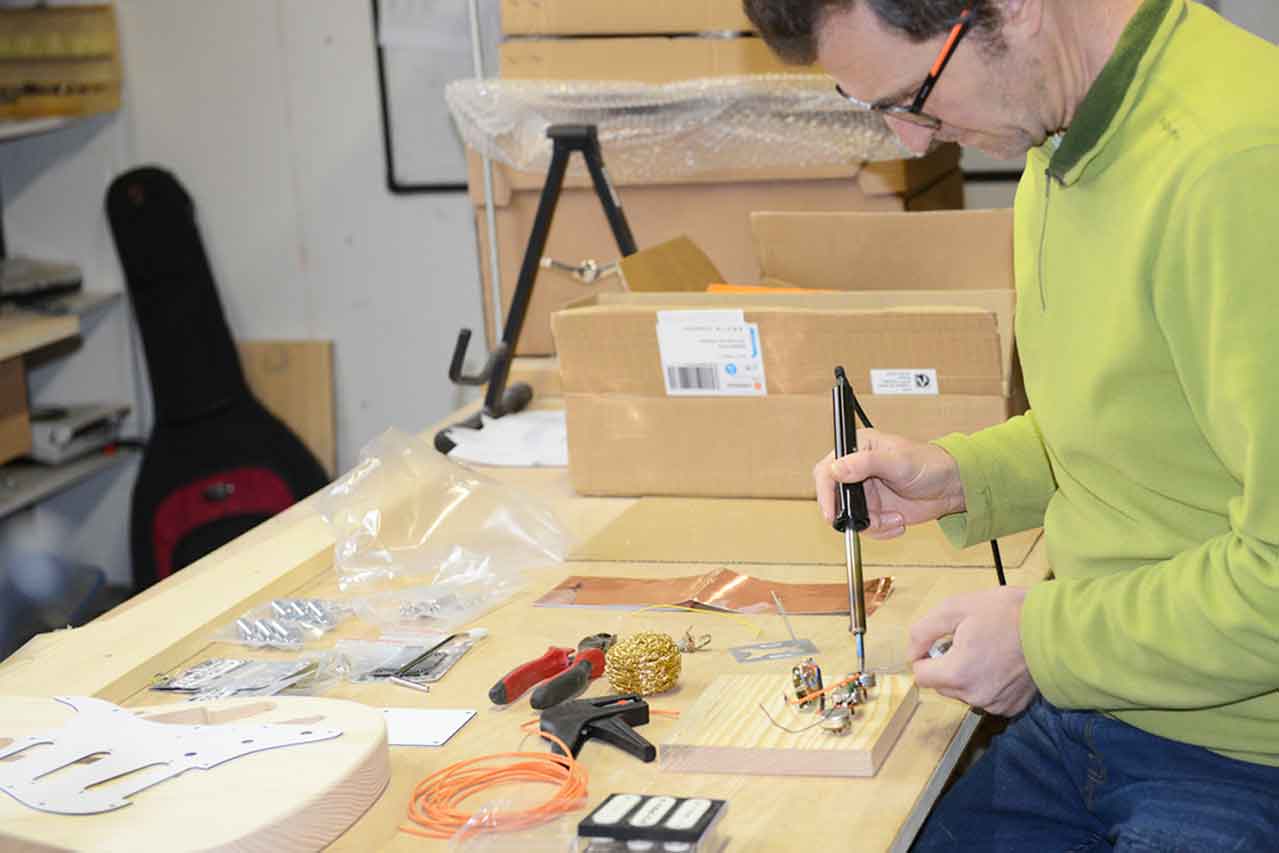
When you can’t find the parts you want from your aftermarket suppliers, do you sometimes create parts yourself or use specialized craftsmen? Can you give us some examples?
Sometimes I am “stuck”, because I am not available, or not adapted.
In this case, yes, I look for a product in another trade or I manufacture myself.
For example, I regularly buy from RS for electronics, or Visserie service for special screws.
I have sometimes wound pickups during the first containment, or 3D printed pickup covers.
On the other hand, I am often creating my own tools, but that too is time consuming!
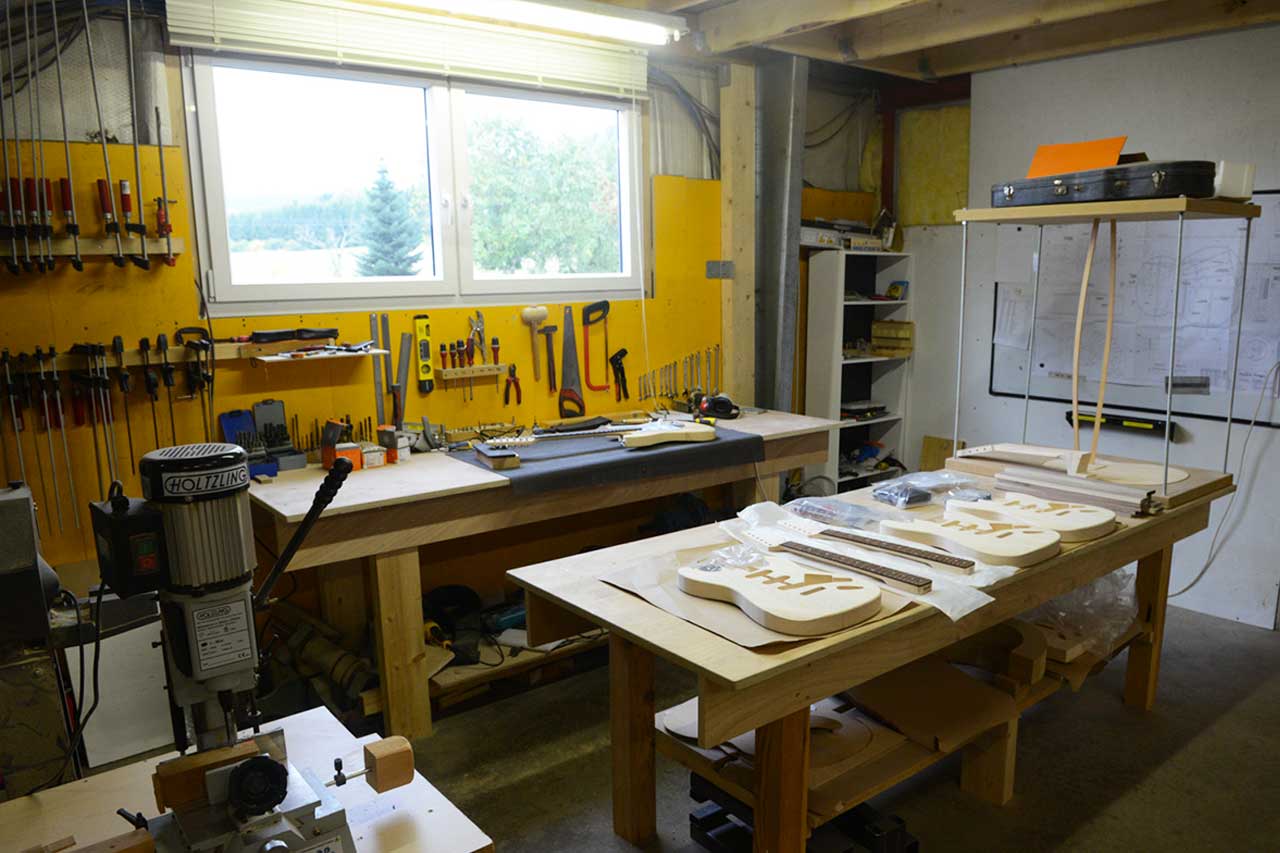
VN Guitars Eric Delaite Luthier – How do you choose the pickups for your electric instruments according to the requests of your customers? Do you have any secrets or habits in terms of wiring? Have you ever had very particular requests, or requests that seemed strange to you from certain clients who had particular needs?
I have tried a few pickups, and for the most part, the SP Custom standards suit me and my customers well.
Of course, I am not opposed to other brands, the customer is king, and the choice is large nowadays!
Varnish… Nitrocellulo, P.U (polyurethane) or French polish? What are your choices and why?
As far as polishes go, I do both.
Nitrocellulo solvent on basswood bodies, and PU on fir bodies.
The choice is purely technical. The nitro solvent for a very shiny and thick finish, the PU for a more natural and silky finish.
I don’t do “French polish” for the moment on my instruments. Certainly on my classic…
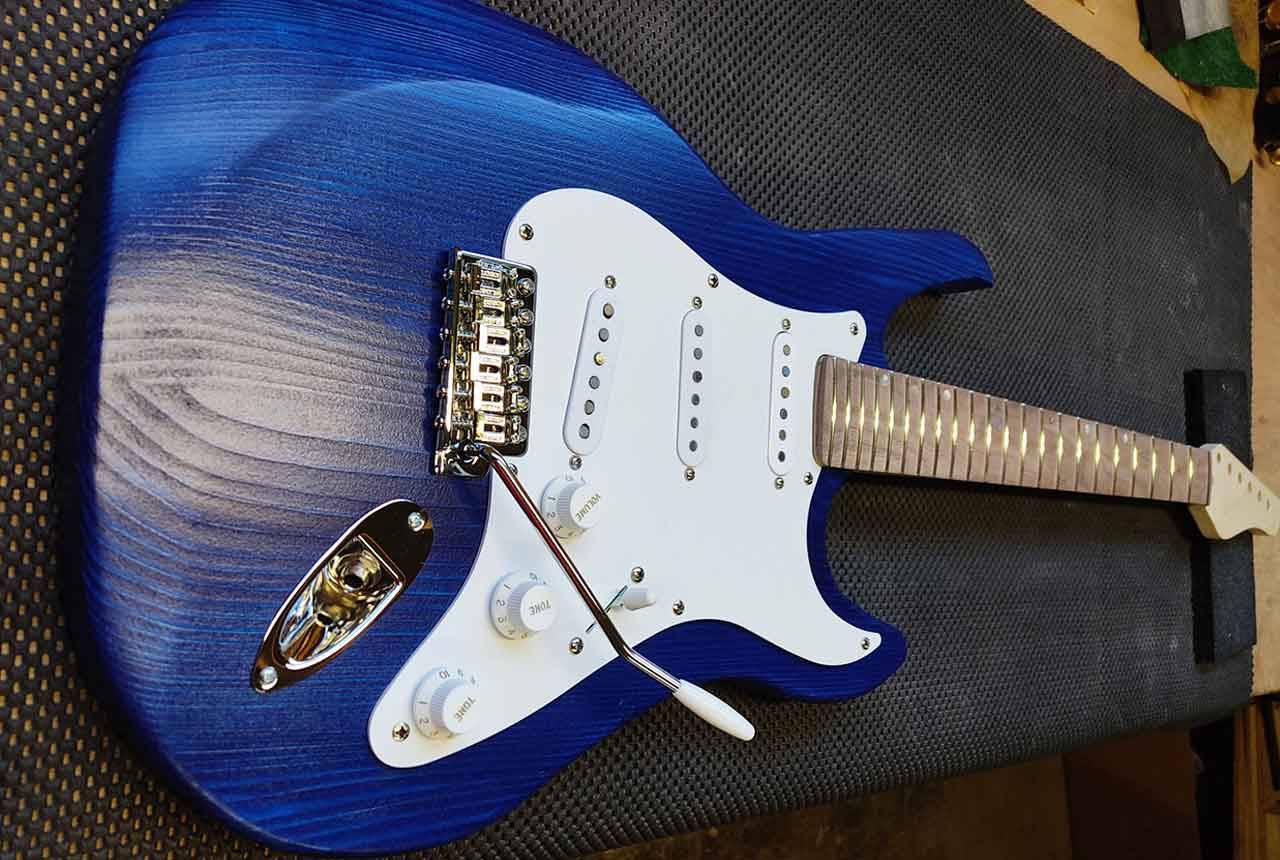
How do you help your customers to choose their electro-acoustic sensors?
I don’t do electroacoustic guitar for the moment…
I did equip a classical guitar with an electro-classic, but that’s about it.
How do you help your customers to choose the fingerboard wood for their instrument in relation to the sound they want to obtain? Can you tell us about the impact of this choice in relation to the other woods used in the construction of an instrument?
As I mentioned earlier, I mainly use walnut.
On an electric guitar, the sound of the fingerboard wood is, from my point of view, very little different from one species to another. Aesthetically speaking, yes, I can put ebony or another exotic wood, but that’s not my business ethic.
I try to remain on a coherent offer and thus to propose a well defined brand identity 100% French wood.
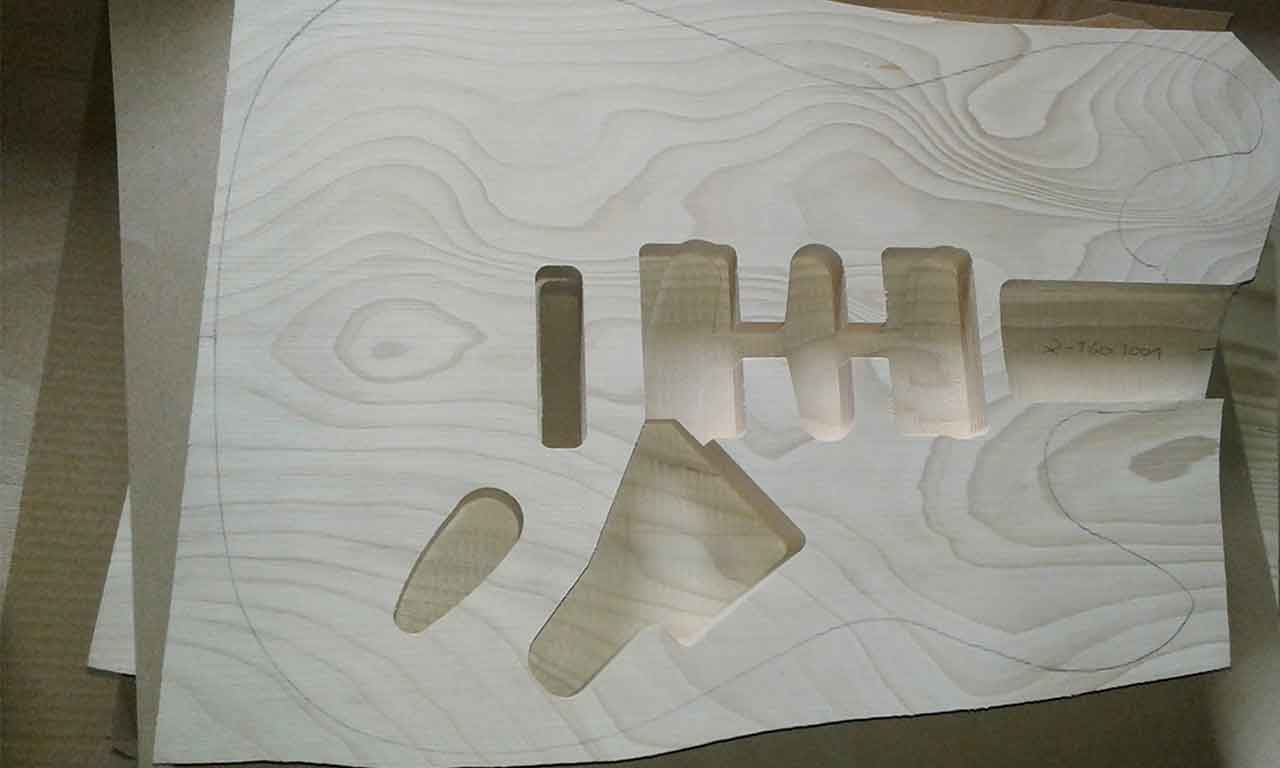
Are you also interested in building amps and effects? And, if not, are you going to go in this direction like many other luthiers?
I make my own speakers, it’s already good!
Amps or effects, no, there are so many offers already, and it’s still another job.
Laurent (Roadrunner) makes great effects, I especially recommend him.
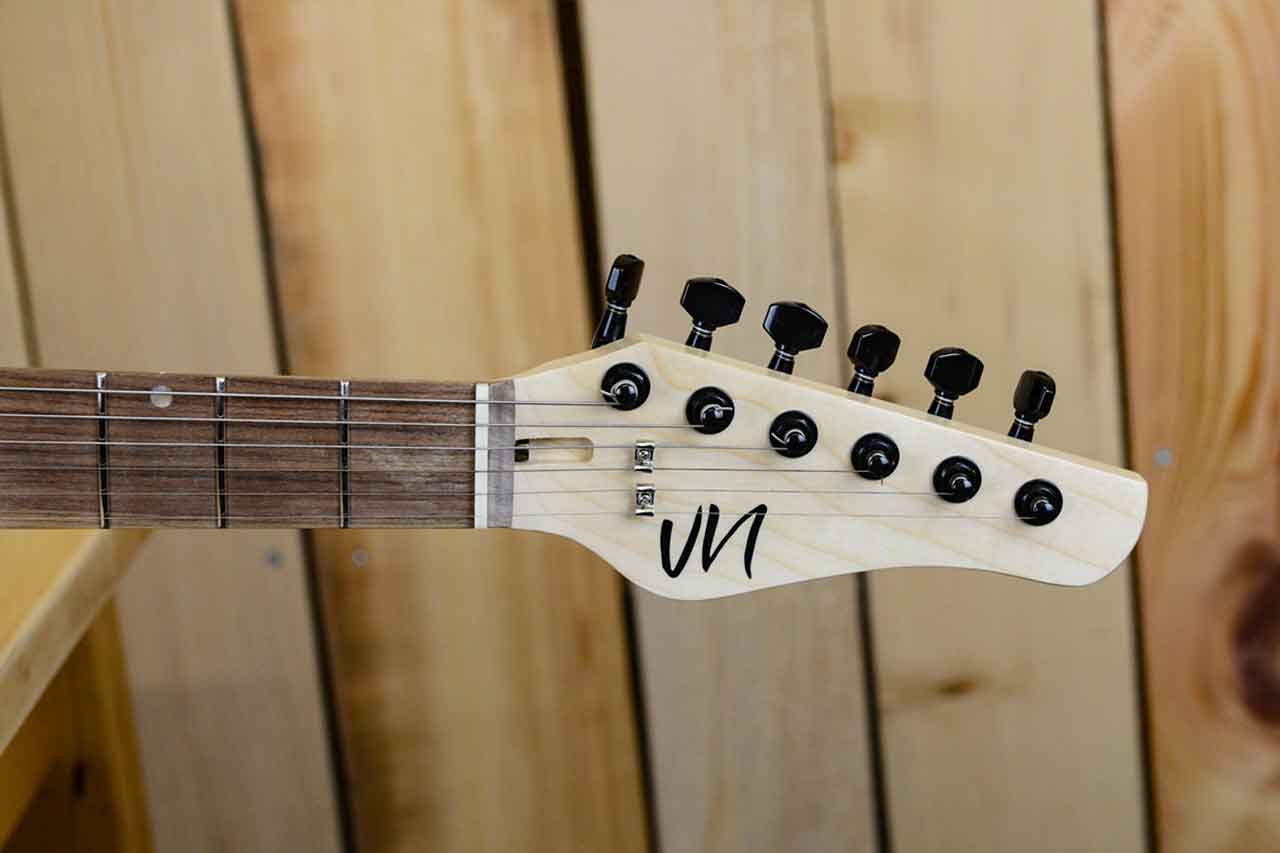
Do you have any advice to give to future young luthiers? Can you give them advice on training? Do you know of any specialized schools?
It’s an exciting job, which takes a lot of time and where you don’t often earn much money!
Joking aside (not that much), I have an apprentice from ITEMM (Le Mans) since September, he has a well thought out professional project over 6 years !
I find his training well planned and I recommend it to those who want to try the adventure. It is absolutely necessary to start with a classic course of carpenter, 2 years minimum.
Then you have to go to a lutherie school.
You have to choose it according to the instruments you want to make! No need to go to Mirecourt if you don’t want to make quartet all your life!
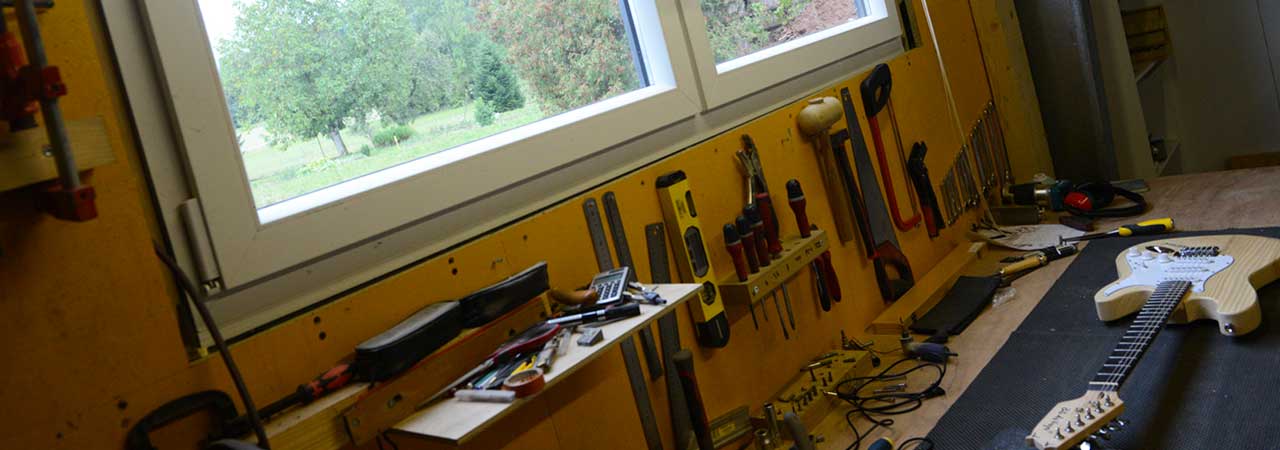
The profession of luthier is a profession that requires an important material investment to start its activity. What would you advise a young luthier to buy to start ? The minimum required ? And, the maximum to be in a comfort of work ?
The big trap is to want “pro” tools to start with.
This is in my opinion totally unnecessary and very dangerous financially.
Safety aside, the basic tools are a good circular table saw, a 300mm planer, a 200mm band saw, a router, glue, scissors, pliers. Nothing too fancy and you can find these everywhere.
I recommend the brands Shepach, Jean-lébeniste, or any equivalent.
On the other hand, you should not neglect the finishing tools. Dry and wet sandpapers, various sanders, filing sponges and other files, rasps, there is always one missing.
The specific tools of the luthier are to be bought with parsimony. They are expensive and very specialized.
Make a well-targeted choice, ask a colleague for advice, do not rush.
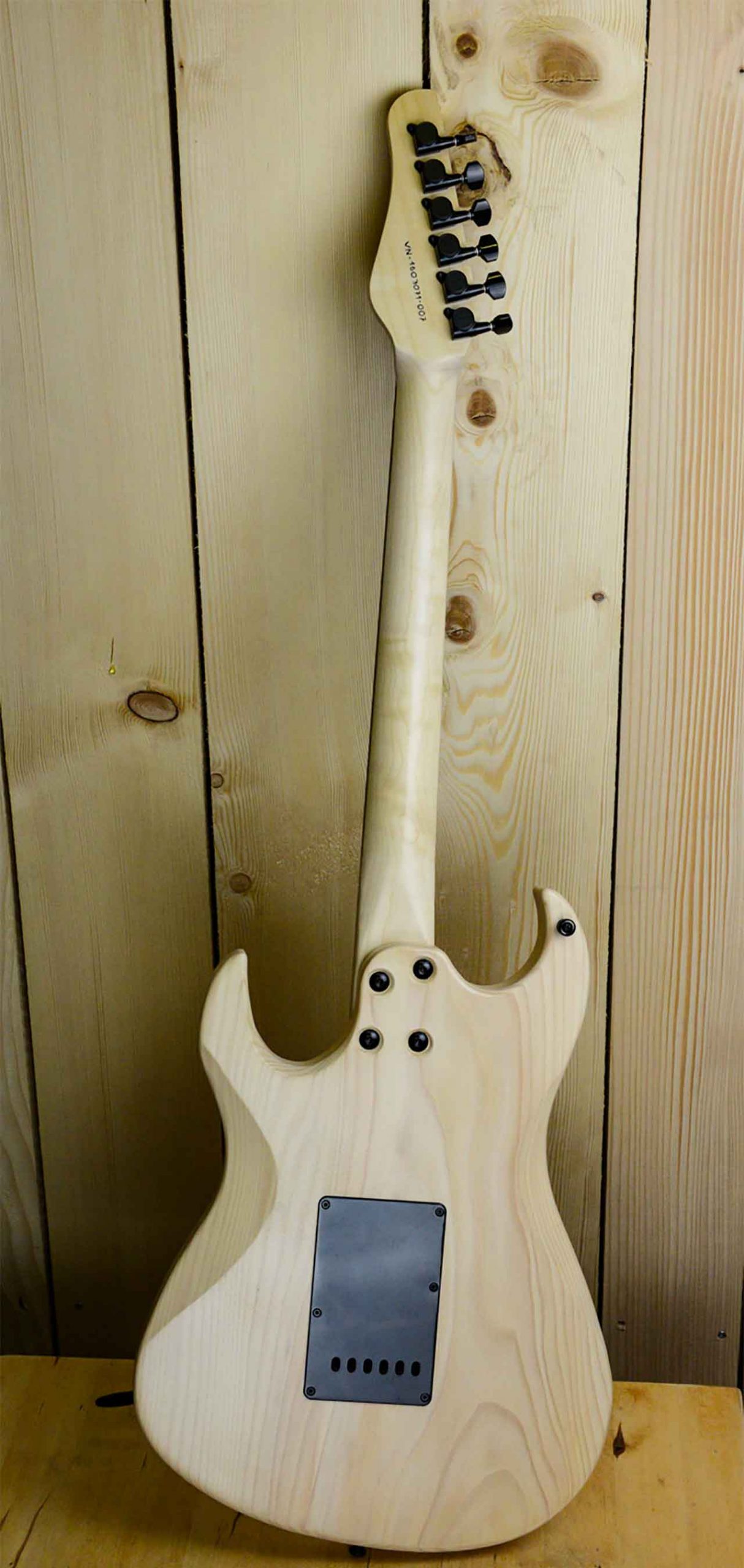
Otherwise, an important point often neglected: the workbench and the workshop.
It must be big enough, but not too big, otherwise it is impossible to heat!
Starting in your house is a good idea, but think about the welcoming of customers, the access, the place to park, etc..
A word to conclude, I think that communication is ultra important, much more so now with the sanitory context.
Musicians flock to the well-known and cheap brands from Thomman and Woodbrass, or even a little more expensive with a cool name (Fender and Gibson) because they go to their favorite stores.
Stores don’t like to sell luthier’s instruments. They are already having such a hard time surviving right now!
Imagine if they have to deal with an instrument sold without recoverable VAT, advance a very large amount of money, promote themselves a guitar they don’t know much about. It’s so much easier to put an Ibanez or a Fender in the display window, it’s a guaranteed sale!
So yes, national promotion is absolutely vital.
Christophe from Luthiers.com is working hard on it, I thank him for it, it will be long, several years I think.
The best salesman for a luthier is his first customer.
Also, I think that you should not neglect the entry-level part. The first customers in guitar are the beginners.
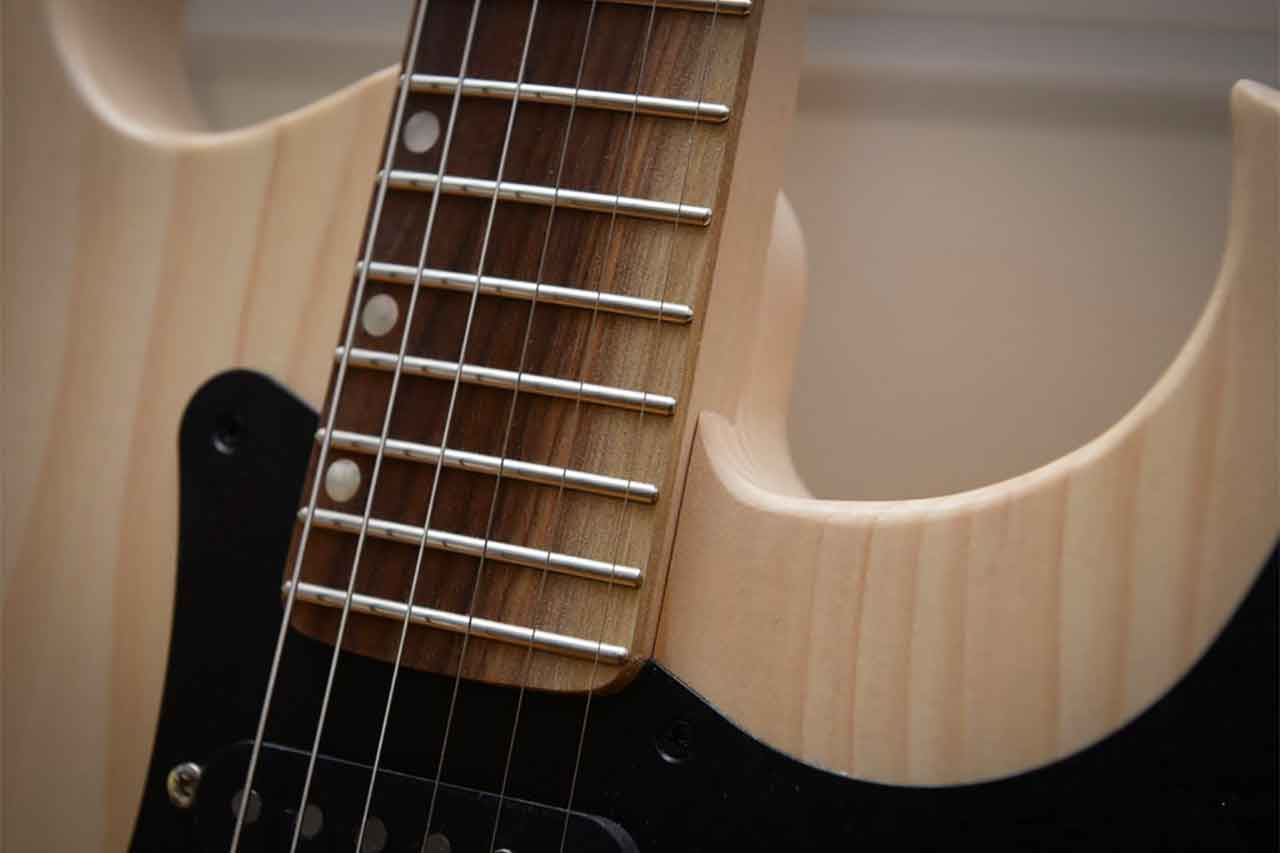
You can contact Eric Delaite from VN Guitars
using the contact form on his personal page on Luthiers.com here :
https://luthiers.com/listing/vosgesnote-vn-guitares/
We also invite you to follow him on his various social networks:
- Facebook: https://www.facebook.com/profile.php?id=100057104843556
- Instagram: https://www.instagram.com/vosgesnote/
- Website: https://www.vosgesnote.fr/index-en.html
VN Guitars Eric Delaite Luthier Interview 1 Background
In the coming weeks, as for others luthiers for plucked string instruments, luthiers for bowed string instruments, amps & effects makers, wood & supplies dealers, lutherie events, jobs, schools & teachers subscribers on our site, you will be able to follow our series of mini-interviews dedicated to the fascinating world of luthiers.
See you soon…
#luthiers
Subscribe to the newsletter!
Subscribe to our newsletter to follow all our news and those of our luthiers.
If you are passionate about the world of luthiers, join us!